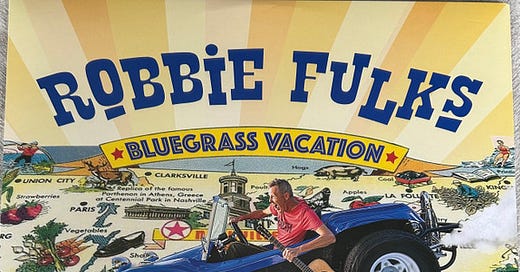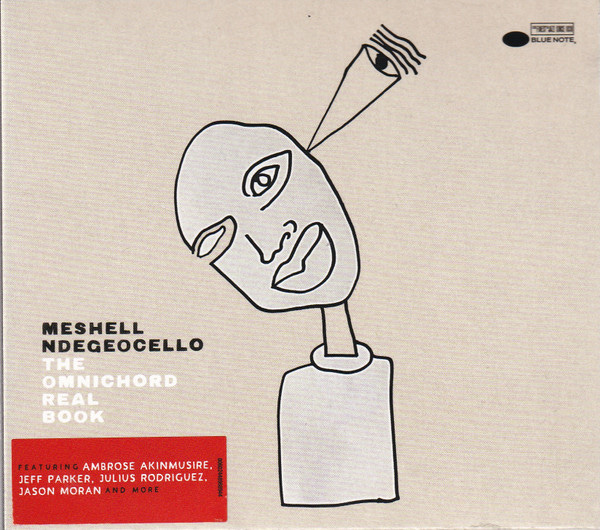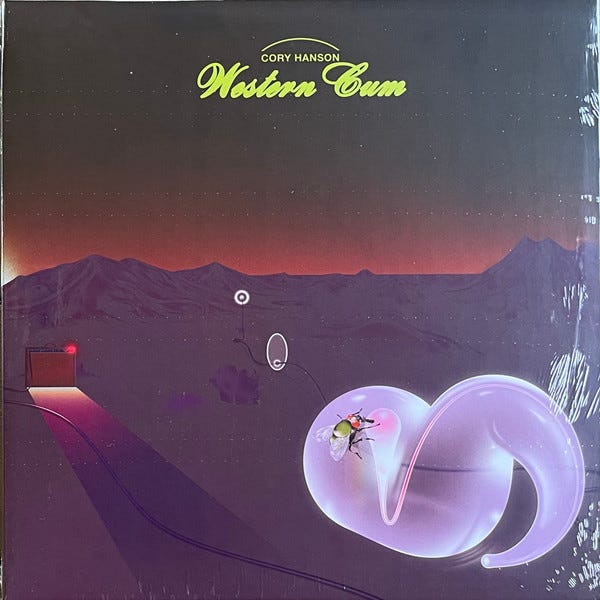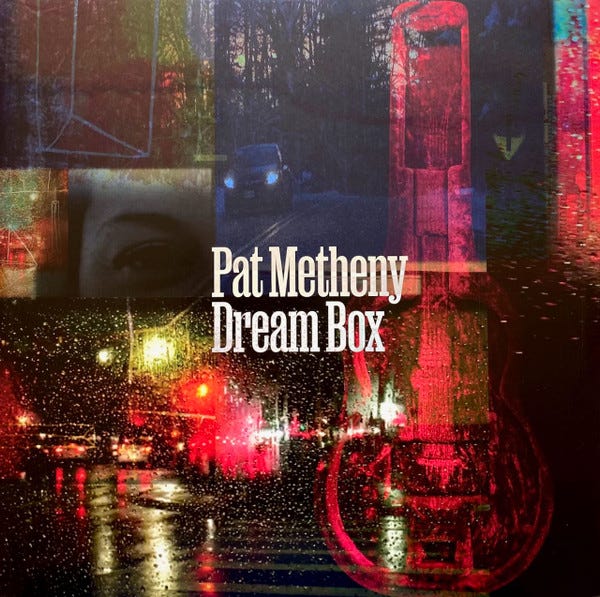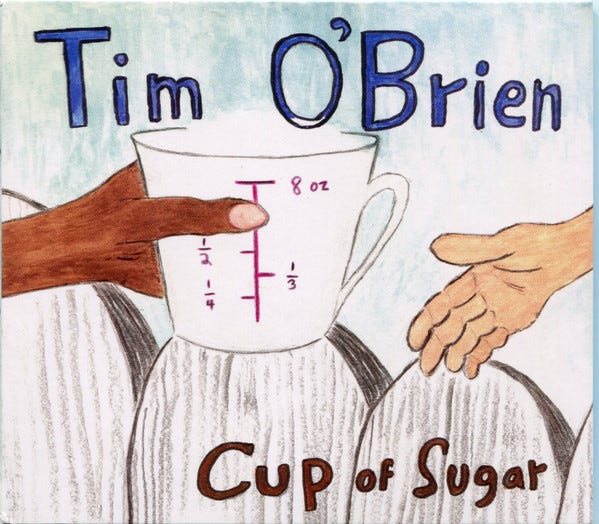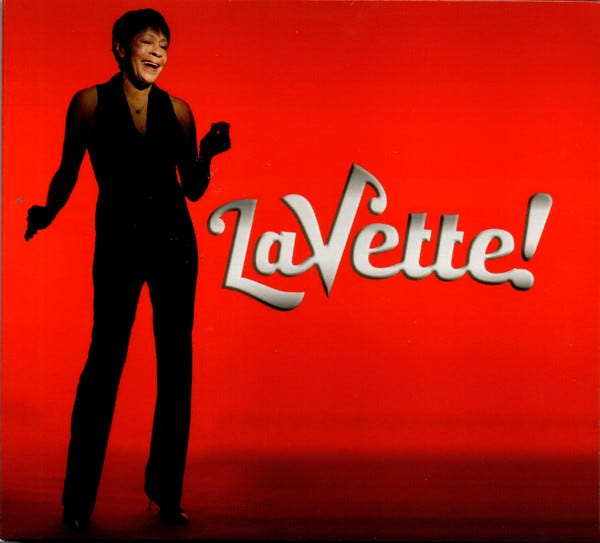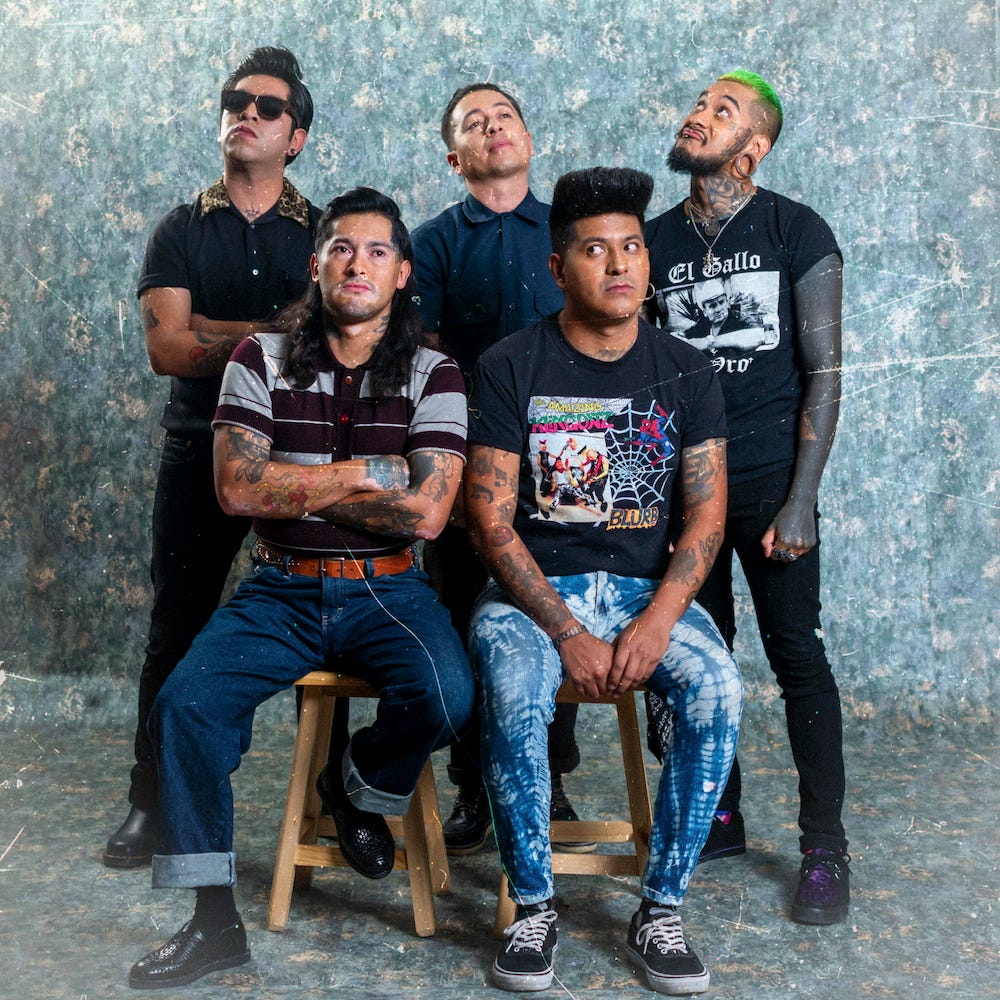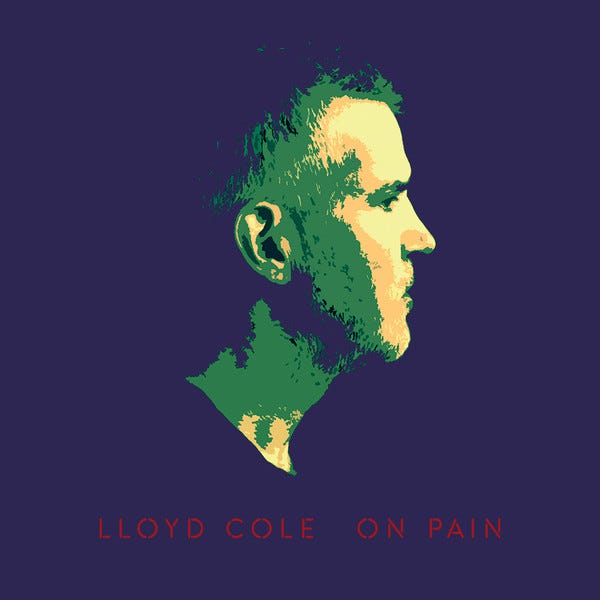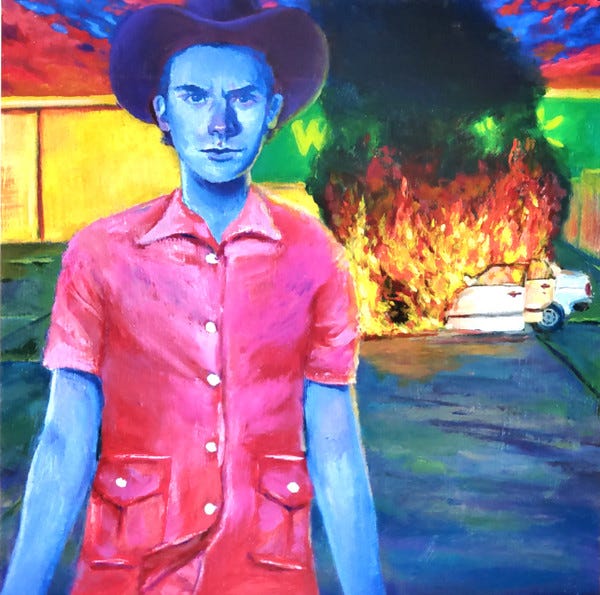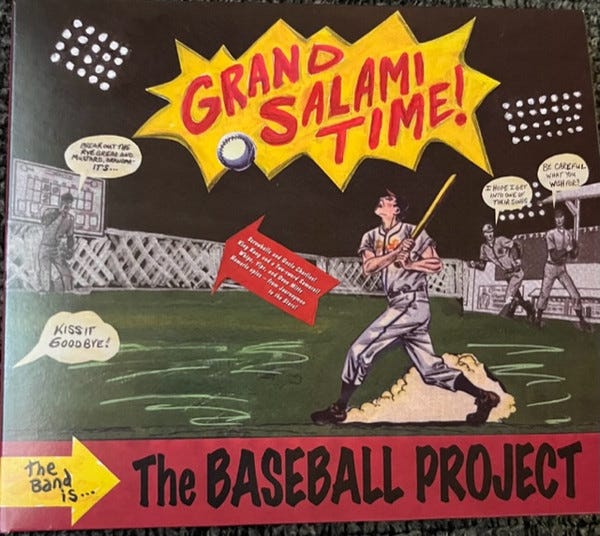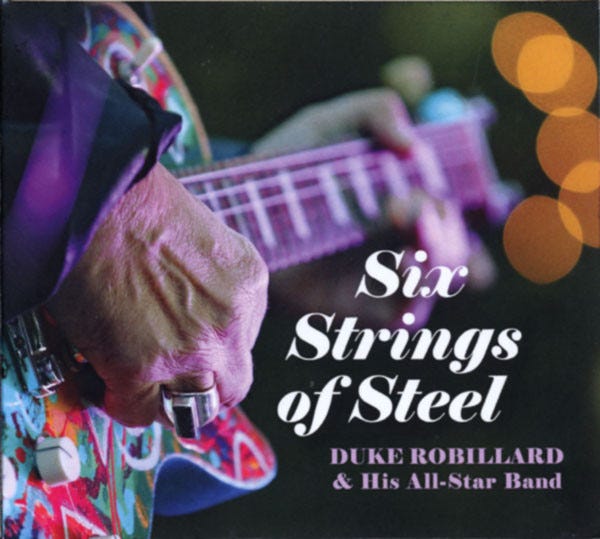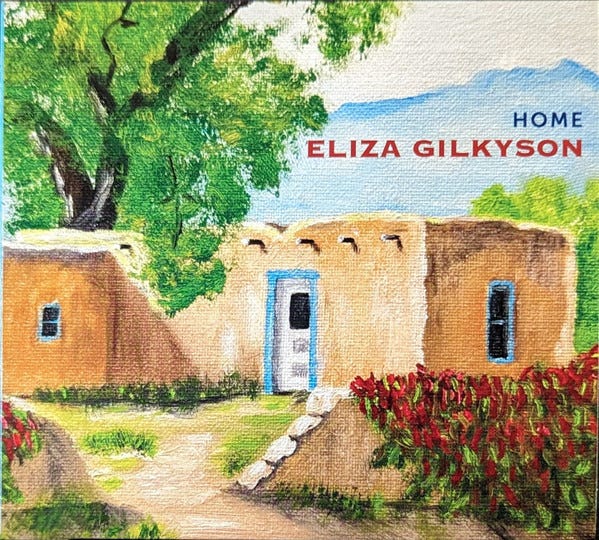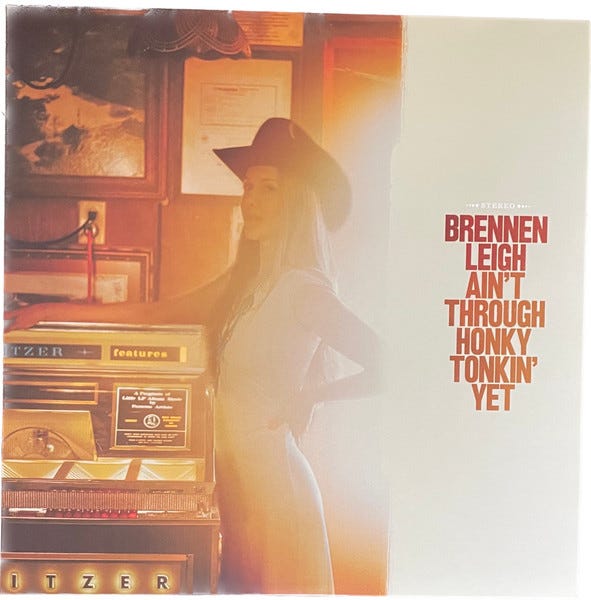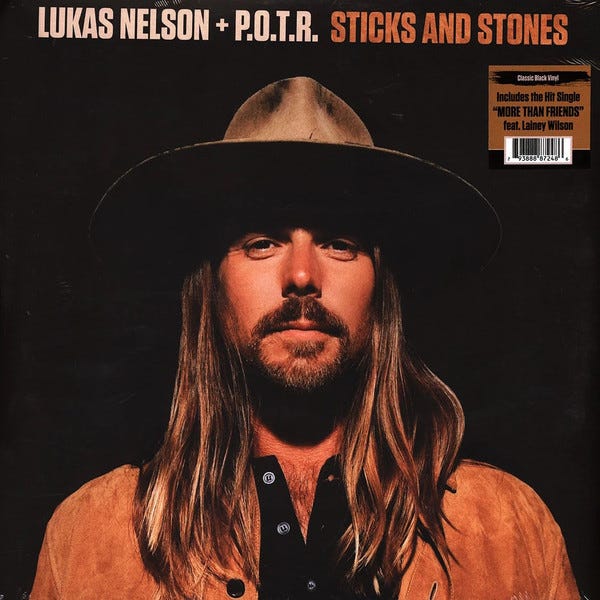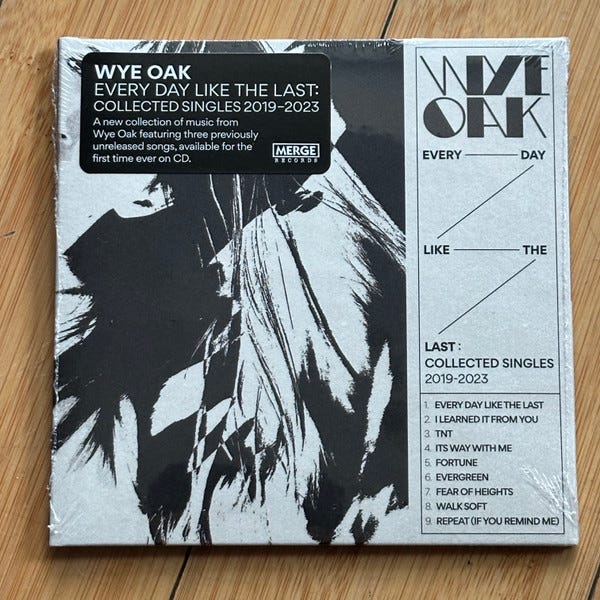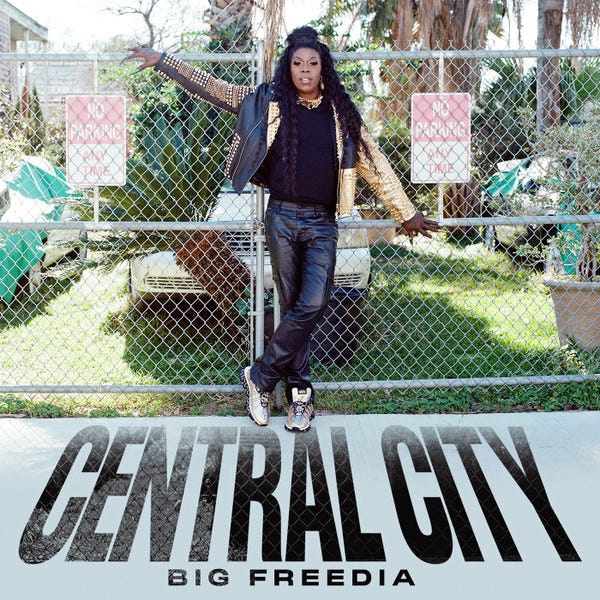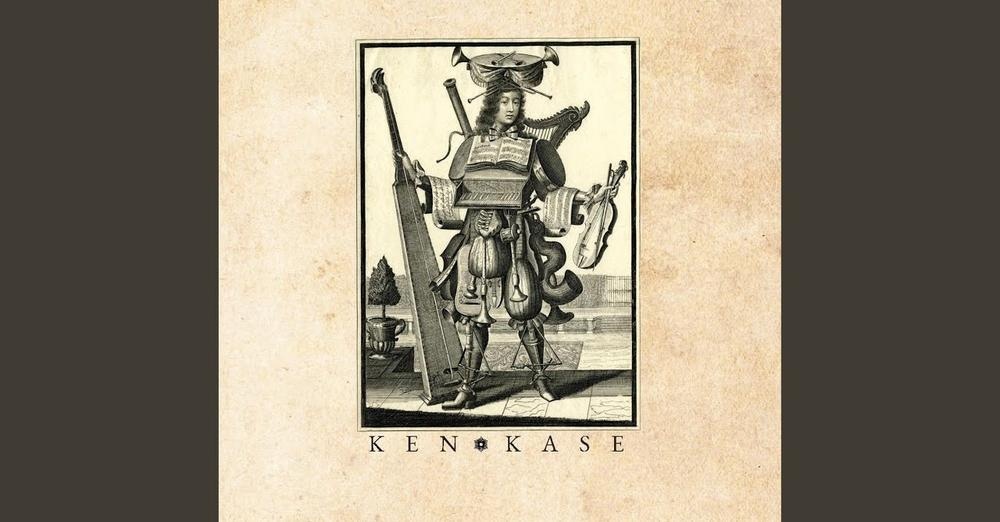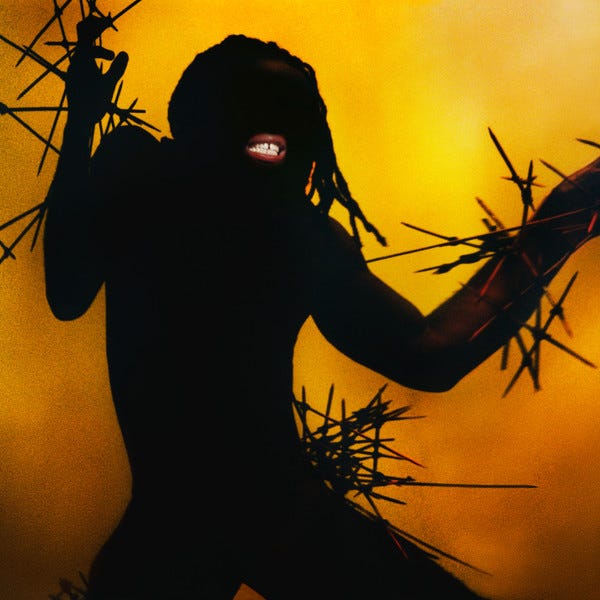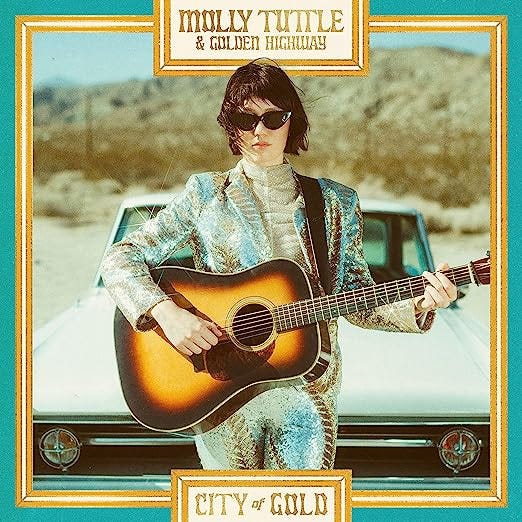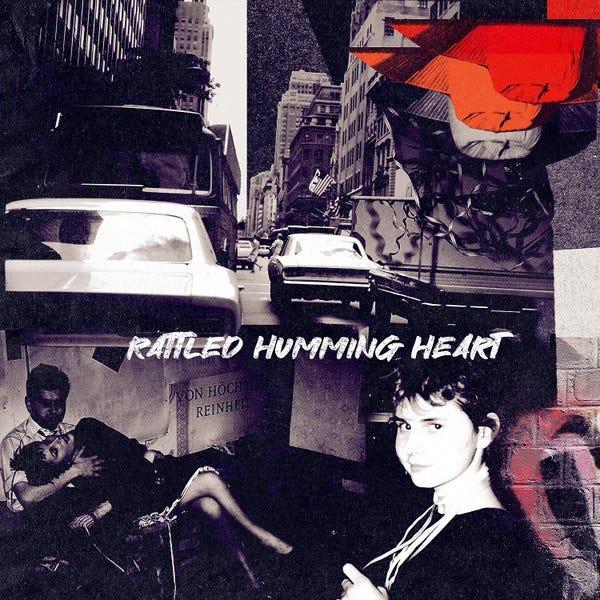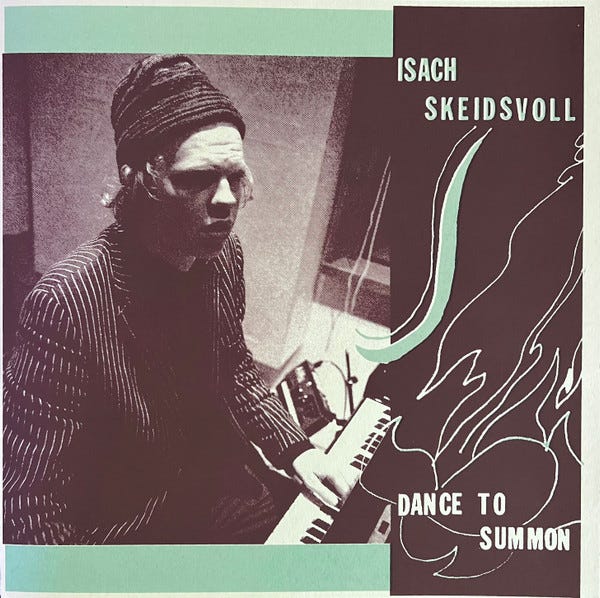Best New Records I Heard in July
I'm struggling to keep up, have lots of good things yet to hear
Robbie Fulks – Bluegrass Vacation. At 60 years old, Fulks has been an insurgent country artist long enough now to whip through the old rolodex and call in favors from bluegrass musicians he’s run into throughout his career. Players like Sam Bush, Jerry Douglas, and Tim O’Brien represent the old school, and Alison Brown and Sierra Hull lead the younger folks. The joy of the album is the combination of all these musicians with some of Fulks’ sharpest songwriting yet. He’s working within the formal constraints of bluegrass but bringing his entire history as a country writer to it. Sentimentality meets hard-edged reality in songs like “Momma’s Eyes” and “Molly and the Old Man.” You could almost say the same about “Longhair Bluegrass,” a celebration of ten-year-old Robbie’s first encounter with the genre at some festival fifty years back. It’s just that here the sentiment is in the transcendence good music can provide, and the reality is his opinion that “They weren’t the greatest songs / And the solos went on too long.” Neither problem is apparent here.
King Gizzard & the Lizard Wizard – Petrodragonic Apocalypse; Or, Dawn of Eternal Night: An Annihilation of Planet Earth and the Beginning of Merciless Damnation. I love these guys to death (metal). This is their second metal pastiche album, which seems to be about dinosaurs and dragons and the end of the world, not that I can understand 90% of the lyrics. I don’t care what it’s really about, because it just plain kicks ass. Double bass drum grooves that swing! Twin guitar leads that can even be tripled by the vocalist. Speaking of vocals, the guy who does the deep rumble projects attitude, and the higher pitched guy (who sings more on their regular records, whatever regular means for a band this multi-faceted) joins in now and then. Trademark “woohs” are kept to a minimum, which makes them more effective when they show up. I don’t listen to much real metal, but if there’s more out there like this one, let me know.
Meshell Ndegeocello – The Omnichord Real Book. “They’re calling me / Back to the stars / Deep outer space.” Ndegeocello chants this Sun Ra style phrase in two versions of her tune “Virgo,” one featuring harpist Brandee Younger and multi-instrumentalist multi-genre composer Julius Rodriguez. The other is arranged by none other than Oliver Lake, the saxophone legend I haven’t encountered in way too long. Both versions share Ndegeocello’s penchant for genre assimilation – you can’t pin her down even when you can say this is a jazz move, that’s a little funky, and this right here is clearly inspired by South African rhythms. The rest of the album is more of the same, with guest appearances by titans like Jason Moran, Joel Ross, Jeff Parker, and Ambrose Akinmusire. Everybody is willing to play her riffs the way she wants them to, and in return, she lets them solo in any direction they feel. Some of these songs are barely there before they’re over; all of them take turns hitting me right in my soul.
Cory Hanson – Western Cum. It’s possible I’m missing some clever allusion to some piece of pop culture I’ve never encountered, but this strikes me as being among the worst album titles in history. My advice – ignore the title, just refer to it as the new Cory Hanson album, or the rock record with the bitchin’ dual guitar parts. Not since the heyday of Thin Lizzy have I heard so many grand and glorious riffs played simultaneously on two distinctly differently toned guitars, one in each channel of the stereo mix. They’re all put to service on songs that do evoke road trips in seventies muscle cars with the top down and the wide open spaces flying by. He’s singing about weird things, like catching a housefly, or chasing down a ghost ship in a sea of taxidermy (I’m not asking where he gets his ideas). His voice is as innocent as Doug Yule sometimes, but the music is all sexy rock’n’roll.
Pat Metheny – Dream Box. I’ve heard a lot of Metheny’s records, but certainly not all of them. As a result, though he’s done two or three solo guitar albums before this, I’m encountering this facet of his enormous talents for the first time. It’s gorgeous, Metheny essentially dueting with himself on electric and baritone acoustic guitars. Six original compositions sit nicely along three standards (though one of those, “Never Was Love,” is an obscurity apparently well known to fans of yacht rock, which ain’t me, babe). The record is filled with melody and contemplation, with just a hint of melancholy here and there. It refuses to melt into the background, despite it’s quiet tone.
Tim O’Brien – Cup of Sugar. O’Brien has been around the acoustic music world for 50 years now. He can play pretty much anything with strings, and has a warm, and solidly comfortable voice with which to sing. I’ve enjoyed several albums by him over the years, and found his presence on other people’s records to be a good indicator of quality. But I’ve never realized until now just how good a songwriter he is. The thirteen cuts here are smart, observant, clever, funny, and honest. Whether singing about a millionaire dog pissing on a Confederate statue or imagining Walter Cronkite reminiscing from the afterlife, O’Brien creates and inhabits the right mood for the right song every time. He gets some help on backing vocals from his wife Jan Fabricius, and recruits none other than Del McCoury to sing with him on the most bluegrass song here, “Let the Horses Run.”
Bettye LaVette – Lavette! Interesting that she exclaims her last name as the title of her new album, considering that all the songs come from the pen of Randall Bramblett. I suspect it’s as much to do with her considering Bramblett’s songs a perfect fit for her soulful reflections on love’s pain and life’s difficulties as it is with the fact that no matter who has written the song she sings, it’s always going to sound just like Bettye LaVette. She’s spent better than fifty years honing an idiosyncratic style which depends on breaks and rasps in her voice to convey an extra level of personal connection. She’s never had a huge audience, but at least in recent years she has been noticed more steadily by the soul revival and even Americana worlds. (I admit it – it was the album she did backed by Drive-By Truckers that first brought her to my attention.) This is probably her most consistently strong record in a while – Bramblett’s songs are sharp, and the musicians – including Pino Palladino and Steve Jordan in the rhythm section – are perfect for this Southern soul with hints of country.
Son Rompe Pera – Chimborazo. What I don’t know about cumbia could fill a lot more Wikipedia pages than are out there on the subject. It’s Colombian folk music that spread across Latin America, and seems to be from a mixture of indigenous people, enslaved people, and conquerors in origin. These kids are Mexican, and they are firmly entrenched in the modern cumbia world, with the added attraction of playing the marimba. I remember that instrument from my dad’s record of the Baja Marimba Band back in the mid-sixties – it’s like a wooden xylophone, and it sounds really cool. Throw in electric guitars, tasteful synthesizer sounds, and an enthusiasm strong enough to name a song “Cumbia Is the New Punk,” and you’ve got one of the most infectious and thoroughly enjoyable records I’ve heard this year. There are lots of guests from the cumbia community, too, so if I find time, I can discover a lot more music to go with this.
Lloyd Cole – On Pain. Here’s a name I hadn’t come across in 30 years. It turns out that even after he broke up his band of followers the Commotions, Cole has been making records at a pretty regular clip. This one managed to cross my path via an Allmusic.com recommendation – I always check their New Releases on Friday to find things like this that don’t get noticed otherwise. Cole is now working with synthesizers more than guitars, but his trademark sense of melody is still intact – simple phrases sung straight forwardly, insinuating themselves into your head and your heart before you even know it. I like the way his voice sounds against the electronic chords and beats, too. Good to have remade his musical acquaintance.
Hayden Pedigo – The Happiest Times I Ever Ignored. This young man has already acquired a distinctive approach to acoustic guitar finger-picking and composition. I think this is his fifth album since 2014, but it’s the first I’ve heard. He’s drawn comparisons to John Fahey, but he doesn’t sound as stately as that master, and he’s certainly not as fast or showboaty as Leo Kottke. There’s a faint resemblance to the late great Michael Hedges, but Pedigo plays prettier melodies with less of a jazz influence. These tunes are quite lovely, and intricately designed. There are some very quiet pedal steel or synth backings, but you can be excused for thinking this is basically a solo acoustic guitar showcase.
The Baseball Project – Grand Salami Time. For the third time in 15 years, Steve Wynn, Scott McCaughey, Peter Buck, Mike Mills, and Linda Pitmon have come together to sing songs that celebrate the ins and outs of the American Pastime. (Well, technically, Mills didn’t join up until after the debut album, but we’ll consider that an asterisk in the record book.) It’s impressive to me not only how much they love baseball itself, but how they aren’t afraid to use up really catchy hooks and choruses on what is essentially a side-project for each of them. Cheer on Shoehei Ohtani, groan about Disco Demolition, feel for the rookie who can’t hit a curve ball, ponder the fate of a player who died too young, celebrate the late great Vin Scully. I also recommend listening to this back to back with Chuck D’s We Wreck Stadiums release. Just like Ernie Banks always said, let’s play two.
Duke Robillard – Six Strings of Steel. Those of you who take careful notes and study everything I say will remember that last month I was enthusiastic about Bob Dylan reclaiming his somewhat obscure classic “Watching the River Flow.” Well, damned if Duke Robillard doesn’t come along this month and do another version. (I’d forgotten Robillard actually played on Dylan’s Time Out of Mind album, so he’s had a Dylan connection before.) As usual, Robillard and his bandmates put together a rock solid blues party record, with a bunch of original material that sounds like long-lost ‘50s 78s and a handful of covers from the likes of Fats Domino, Ike Turner, and Link Wray. Robillard is a supremely tasty guitarist, but the whole band shines – this is never a showcase for one instrument. Some 55 years into his career, Robillard continues to play the blues and other roots musics with a delicious fervor.
Eliza Gilkyson – Home. I don’t know why some Eliza Gilkyson records find their way into my presence while many others just pass me by entirely. Whenever I do get to hear one, I find myself liking it quite a bit, and this new one might be my fave. Gilkyson writes lovely acoustic adult Americana songs, for want of a better descriptor. She has an evocative voice with gently insistent phrasing, which makes whatever she sings more likely to stick its claws into a listener. Robert Earl Keen and Mary Chapin Carpenter each stop by to sing duets with her, and she pulls a Karla Bonoff song out of very deep crates to come up with the extremely lovely album closer which serves as the title of the whole project.
Brennen Leigh – Ain’t Through Honky-Tonkin’ Yet. This woman has absorbed all the musical and lyrical tropes of classic country music. Though her sound is rooted in the early 60s, her songs could easily be adapted to almost any era of the genre’s history between then and now. There’s always an audience for catchy hook-filled songs about drinking in bars, cheating on your man, dumping your man because he cheated on you, finding out you made the wrong choice in a man, and driving a truck cross country while listening to Red Sovine. Leigh has clever ways to make these familiar ideas sound fresh – that truck driver is named “Carole With an E”; that regret is made into a tattooed metaphor because “You Turned Into a Dragon.” And did I mention just how tuneful these songs are, or how she sings with strength and humor?
Lukas Nelson & Promise of the Real – Sticks and Stones. By my count, this is Lukas Nelson’s fifth album in the last seven years, during which time his pops released nine studio records and some live ones. But hey, Willie doesn’t write all the songs for any of his records any more, so no wonder it takes him a little longer. While previous POTR albums showed more than a few hints of their days backing up Neil Young, this new one is much more focused on showcasing songs than guitar solos. Lukas Nelson is getting better and better as both a singer and a writer. The account of a day on mushrooms in “Wrong House” is a hoot, while “Lying” is a clever but sad lament for a lost love – “I’d be lying if I said I didn’t wish that I was lying here with you.” He hasn’t caught up with Willie yet, but I’d be lying if I said I didn’t think many of these songs could at least compete in the same game.
Wye Oak – Every Day Like the Last. Jenn Wasner and Andy Stack have been doing this indie rock thing for 16 years now, but most of it has gone right past my eyes and ears. Which is weird, because I tend to like them when I hear them now and then. So, this time, I sat down and paid attention, and found Wasner’s elegantly earnest melodies floating effortlessly among the vocal harmonies and backgrounds, the occasional violin counterpoint, the churgling bass lines, and the throbbing drums. This new album was apparently put together after most of the songs had been released as singles, but I think it hangs together pretty nicely. It does tend to perk up about half way through with the song “Fortune” built on a Bowie-esque keyboard riff, and then “Evergreen” which is as close to pop as these two are likely to get.
Big Freedia – Central City. Has there ever been a genre name more perfect than “bounce” for the hip hop form that developed down in New Orleans over the last 25 or so years? Because that is precisely the reaction I get every time I hear this album – I admit it, I’m sitting won while I listen, but my booty is shaking in my chair and my feet are hopping up and down. Freedia and his cohorts – Lil Wayne, Faith Evans, and the Soul Rebels are known to me; Kamaiyah, Kelly Price, Ciara, Boyfriend, and Sonyae I haven’t encountered before – get the party going from the beginning. There is no let-down on this record, though “Gin in My System,” the penultimate track, is so ridiculously intense and downright bounceable that the mind reels considering what a live experience of this would be like. I kind of get the vision that the whole audience would be elevated off the floor.
Ken Kase – Ken Kase. 5 Songs. 20 minutes. Infectious, delightful, pop/rock with personality. Kase has been active in a number of St. Louis bands over the years as both a singer/songwriter/guitarist and as a hired player. He’s a part of the nationally known (and multi-regional) Sun Sawed in ½, whose singer Doug Bobenhouse guest-stars on one track here. (Don’t know who they are? They’re revered in power pop circles, despite, or maybe because, of the fact that their music is so far beyond that genre’s limitations.) Richly evocative melodies are Kase’s stock in trade, arranged cleverly for a bunch of instruments he plays himself (and a saxophone ringer in one case). These songs are favorites he’s written over the last three decades, and his love for them shines in the presentation.
Young Fathers – Heavy Heavy. I don’t know exactly what to do with this record except to just enjoy the vibe. This Scottish band has been around some fifteen years, and the only thing you can count on with them is they will defy any preconceptions, heck maybe any conceptions period. There is a hip hop influence in the rhythms, a bit of TV on the Radio influence in the vocals, and a general experimental influence in the songwriting. I suppose a lot more immersion into the record than just a few spins might reveal more cohesion; for now, though, I’ll simply say this is an intriguing and unusual record.
Molly Tuttle & Golden Highway – City of Gold. Tuttle took a giant leap into the contemporary bluegrass honor roll with last year’s Crooked Tree. Once again working with producer and dobro master Jerry Douglas, she opted this time for an organic band album instead of an all-star session. This works well because a) her band is pretty top flight, and she is one of the best guitarists in the game, and b) her focus is on presenting songs rather than virtuosity. And what songs they are. An epic look at California during the Great Gold Rush; an ode to allowing marijuana sales in her home state; an update of Alice in Wonderland that puts young Alice into bluegrass wonderland (perhaps related to the previous song I mentioned); several songs about love in various states of success (including an unlikely but wonderful duet with Dave Matthews); a bit about the rigors of touring; and a frightening and devastating look at a young pregnant woman’s options in the post-Dobbs world in which we live. Great singing, great playing, great songs.
The Midnight Callers – Rattled Humming Heart. You’d swear you should have heard Casey Kasem talking about the number of weeks they’ve spent on the top 40, or you’ve seen them on The Midnight Special or Don Kirshner’s Rock Concert. This New York foursome has assimilated the best proto-power pop bands of the 70s – the Sweet, the Raspberries, Badfinger, Cheap Trick – and the 60s – the Beatles, the Who. It’s two guitars, bass, and drums all the way (with one song having a brief keyboard part), and all four of these guys sing beautiful harmonies. With a knack for coming up with huge hooks and guitar riffs, the Midnight Callers have to be among the finest revivalists this pseudo-genre has ever had.
Isach Skeidsvoll – Dance to Summon. Don’t be fooled. The first 1:20 of this record is just shaking and rattling percussion instruments which calls to mind a quiet night in a swamp where the frogs and crickets are lazing about rather than seriously making noise. But then this Norwegian piano player starts rumbling a repeated riff for another minute and a half before suddenly this gigantic full band sound (which is really three saxophones, pocket trumpet, bass, and drums) pumps its own version of that riff. Skeidsvoll writes remarkably catchy jazz tunes which give his bandmates lots of room to blow wild on their solos. The ensemble playing is magnificent – I’m always hooked by a band with a baritone sax. The solos are terrific. Whether a three minute hookish gem or a fourteen minute trip around sonic possibilities, every one of these six cuts demands closer study even as it taps all the pleasure centers.
